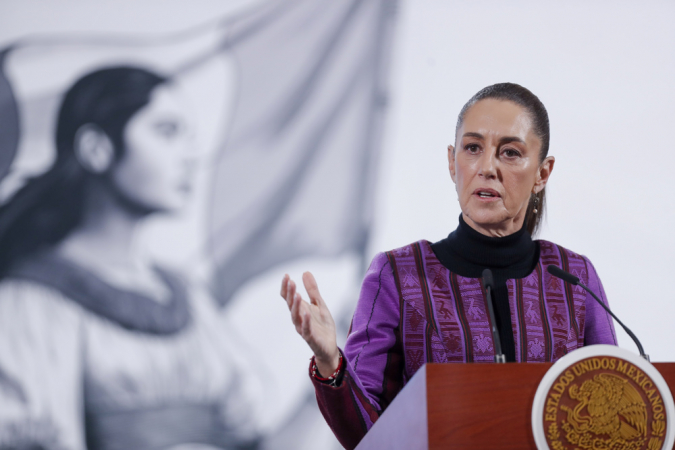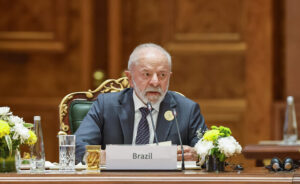
Published 25/03/2025 13:35 | Edited 25/03/2025 14:29
Last Wednesday, March 19, Mexico President Claudia Sheinbaum denounced a digital war against her government, orchestrated with bots and millionaire campaigns of misinformation. The offensive aims to destabilize its administration, associating it with organized crime. This phenomenon is part of the concept of ‘hybrid war’, a strategy used to undermine governments without direct military clashes.
This type of attack is not new in Latin America, nor the exclusive Mexico. On the contrary, it is a recurring phenomenon in global southern countries, where digital campaigns are used as tools for destabilizing governments. This pattern can be understood in the light of the concept of “hybrid wars,” discussed by Andrew Korybko in his book Hybrid Wars: from colorful revolutions to blows.
According to Korybko, hybrid war is a contemporary strategy of political and geopolitical destabilization, which combines conventional and unconventional tactics to weaken governments and provoke regime changes – all without the need for direct military confrontation. Instead of tanks and troops, this form of war uses coordinated disinformation campaigns, manipulation of public opinion and, in some cases, until the financing of opposing groups.
The great danger of this strategy is its ability to infiltrate the public debate in a subtle way, creating an environment of political instability that can lead to institutional crises. Exploring social and political vulnerabilities, these digital attacks undermine the confidence of the population in their own government and in the country’s institutions. And when this happens, international actors – state or non -state – find fertile ground to interfere with sovereign nations, influencing their political course without having to resort to military occupations or formal sanctions.
What is happening in Mexico is a reflection of a tactic already tested and applied in other countries. Given this, the big question that is imposed is: How can democracies protect themselves from this kind of invisible war, where battles are fought on social networks and narratives circulating on the internet?
The Mexican Case
With an impressive 80% approval rate and maintaining a daily dialogue with the population, Claudia Sheinbaum has consolidated itself as the world’s most popular leader today. Elected as successor of former President Andrés Manuel López Obrador, she represents the continuity of the political project of the fourth transformation, a progressive agenda that seeks to strengthen social programs, expand rights and reduce inequalities in Mexico. However, this popularity and its political position made it the target of a massive offensive of misinformation.
Last week, Mexico President Claudia Sheinbaum brought out a worrying alert: her government would be the victim of carefully orchestrated “digital war”. According to her, a millionaire campaign took over social networks, driven by bots and automated profiles, spreading the narrative that Mexico would be becoming a narration and that his management would be conniving with organized crime.
What is at stake here is not just the reputation of a government, but the country’s own political stability. Creating this association between government and organized crime is not just a common political attack-it is a well-orchestrated strategy to delegitimize Sheinbaum administration and weaken its governability. This kind of campaign does not happen at random. According to investigations, between March 12 and 17, about 20 million pesos (approximately one million dollars) were invested in defamatory campaigns on the Internet, artificially amplifying these narratives and making them viral.
But what makes this case even more disturbing is the involvement of external actors. Reports indicate that accounts related to international ultra -right from countries such as Colombia, Spain and the United States have actively participated in the dissemination of this information. This suggests that the campaign is not only a spontaneous movement of internal opponents, but part of a wider network, aligned with geopolitical interests that go beyond Mexican borders.
What we are seeing in Mexico fits perfectly with the concept of hybrid war, as described by Andrew Korybko. These tactics do not depend on tanks on the streets or explicit military blows – they operate in the field of information, gradually corroding the legitimacy of a government until it becomes politically unfeasible.
The dissemination of the narrative of a “narcoesto” not only generates internal instability, but also affects the way the country is internationally perceived. This type of strategy has already been tested and applied in other global southern countries, where massive disinformation campaigns have been used to undermine governments considered discomfort for certain international interests.
The most dangerous is that these digital operations can produce deep effects without their guardians having to expose themselves directly. They create fertile ground for public distrust, making it difficult to identify the real articulators of this process. When a population begins to systematically question the legitimacy of its institutions and leaders, the way for instability, social discontent and even forced regime changes open.
The Mexican case reminds us, once again, that hybrid wars evolved and adapted to the information age. They no longer need soldiers or tanks – just algorithms, social networks and investments well directed to plant the seed of chaos. The challenge now is to recognize these tactics and strengthen democratic defense mechanisms against this kind of manipulation.
Challenges to democracy
One of the most worrying effects of this type of campaign is the direct impact on the population’s confidence on their own institutions. When a negative narrative is exhaustively repeated – associating a government with organized crime or corruption – it begins to erode, little by little, the public perception of the legitimacy of leaders. Even though, according to President Claudia Sheinbaum, only a small portion of the Mexicans is at X (former Twitter), where most of this offensive happened, the damage was already done. After all, misinformation does not need to reach the majority to be dangerous; It is enough for it to reach opinion makers and create a climate of doubt and widespread disbelief. When people fail to trust their rulers and institutions, governability is weakened, making room for popular discontent, political instability and, in extreme cases, even institutional crises.
We live in a hyperconnected era, where the speed with which misinformation spreads is impressive. False or distorted news, driven by algorithms and bots, viralize rapidly, creating perceptions that can become irreversible. A government under constant attack in this way faces gigantic challenges to communicate with the population and implement effective public policies. In the long run, this not only undermines the credibility of current management, but can lead part of society to completely reject their leaders, generating cycles of crisis that feed protests, political turmoil and even attempts to overthrow democratically elected governments.
Another alarming factor in this type of offensive is the direct risk it represents for the democracy and sovereignty of a country. When internal or external forces manipulate public opinion through hybrid war, they weaken the autonomy of nations, artificially influencing the political course. This is not just a narrative dispute; We are talking about a sophisticated method of indirect intervention, which can place a country in the hands of foreign interests without a single shot.
What is at stake is not just a government, but a nation’s ability to decide its own direction without external interference. When misinformation campaigns reach this level of sophistication, they may even justify economic sanctions, international pressures and, in more severe cases, serve as a pretext for blows or other forms of direct intervention. Although silent and often invisible to the general public, Hybrid War is one of the most effective tools for destabilization in contemporary politics.
What happens in Mexico is now not an isolated case. What Claudia Sheinbaum has denounced is part of a standard already seen in several countries in the global southern. Disinformation campaigns are used as weapons to weaken governments that do not align with certain interests. When a government loses its credibility in the eyes of the population, its sovereignty is also weakened, becoming more vulnerable to external and internal pressures.
Given this scenario, the question that is imposed is: How can governments and societies protect themselves from these new forms of attack? It is essential that there are strategies to strengthen democratic resilience, combating misinformation with transparency and investing in media education. Regulate the use of social networks to avoid their political instrumentalization, blaming platforms by fake news campaigns, and encouraging solid investigative journalism are essential steps to ensure that popular sovereignty is not kidnapped by hidden interests.
The hybrid war of the digital age does not need traditional weapons, but its effects can be as devastating as. The answer to this challenge is not simple, but it begins with a fundamental principle: the defense of truth as a pillar of democracy.
__
Source: vermelho.org.br

